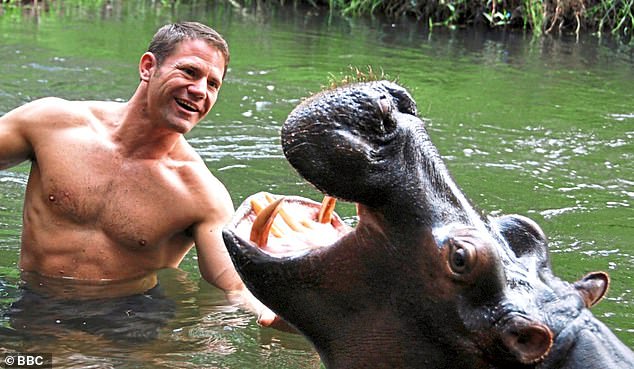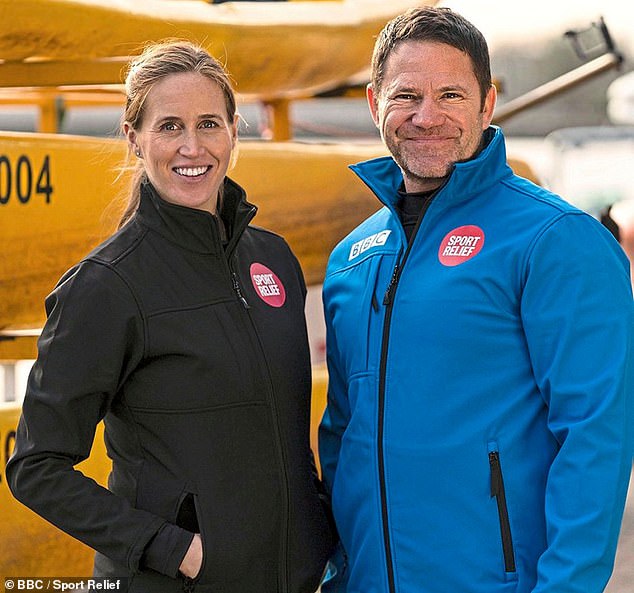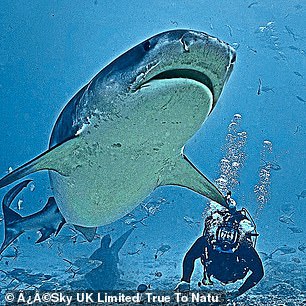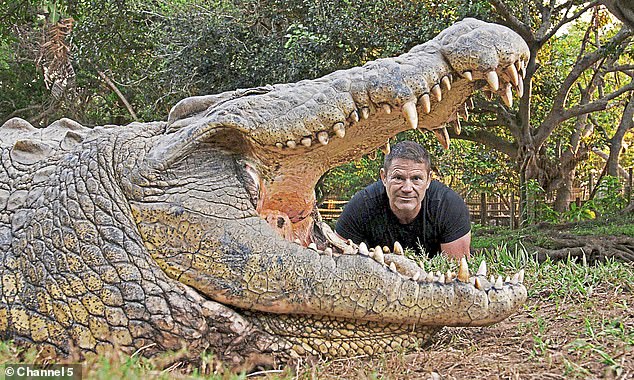The humble shrimp isn’t the first thing that springs to mind if you want a creature named after you. But Britain’s best-known wildlife daredevil, TV presenter Steve Backshall, is delighted to have discovered a species that has been dubbed the Backshall snapping shrimp.
“It has one giant claw and one tiny claw, but it uses the big one to snap and create an incredibly loud sound that serves as a powerful deterrent to other animals,” Steve explains. “I named it after myself because I was diving in Tenerife when we found this new creature. It’s tiny, but absolutely beautiful under the microscope.”
Steve, 51, came across the species as part of a mission with Ocean Census to accelerate the discovery and protection of marine life by finding 100,000 new species in the next decade, and will be telling stories of his adventures (and his exciting career in general) in his upcoming UK touring show, Ocean.
“It’s very special to know that you can hold in your hands a creature that no one else has seen before, that your eyes are the first to have seen it,” he says.
“Plus, knowing that our deep seas are the largest but least-known habitable environment in the universe is exciting. The opportunities to find creatures we don’t yet know about are limitless.”
Daredevil Steve Backshall (pictured), 51, poses with a crocodile named Henry at the Crocworld Conservation Centre in KwaZulu-Natal, South Africa. At 120 years old, Henry is the world’s oldest living crocodile.
Steve doesn’t like claustrophobic underwater journeys to the depths of the ocean to find new marine life, but the results make it worthwhile. “We recently found three new species: a tiny fish and a small mollusk inside a larger mollusk,” he says.
‘After each discovery, we bring the new species back to the dockside labs, where experts in all forms of marine life process DNA samples and images before the samples are returned to the ocean.’
Some of the enormous creatures he has encountered in the seas will be on stage with him during the tour, but audiences need not worry: they will be life-size replicas. In addition to these elements, the show includes stunts, experiments, cutting-edge science and footage projected onto giant screens to bring the icons of the sea to life.
“We have a life-size reproduction of a 20-foot-long great white shark, a life-size 30-foot-long orca and a sperm whale. It’s a challenge to fit them into a lot of movie theaters. But it’s very difficult to get a sense of scale with these animals on TV because they’re so big. The show brings them to life.”
Steve has been passionate about the natural world ever since he could crawl. As a child, he regarded the animals around him as his best friends, from the family’s asthmatic donkey to the snakes in the manure heap on his idyllic farm in Bagshot, Surrey.
He then made documentaries for the National Geographic Channel, but became a household name in 2009 when he began presenting CBBC’s Deadly 60, in which he seeks to understand (and educate us about) the planet’s most dangerous creatures through close encounters. The show was subsequently broadcast around the world, and his touring shows draw massive crowds.
Despite his numerous brushes with death, Steve is not afraid of danger or taking carefully calculated risks. In his adventures, he has been strangled by a python, stalked by a polar bear, surrounded by sharks, attacked by hippos and bitten by a crocodile while searching for anacondas in an Argentine swamp.
“The key is not to be afraid because animals smell fear and that brings danger,” he says. “But there have been some hairy moments. The times I have been most afraid have been with hippos. They are one of the most dangerous animals, grumpy and unpredictable. They are easy to attack in the water as well as on land. They may weigh three tons, but they can run like racehorses.

Steve is pictured with a hippo in South Africa, one of the most dangerous, grumpy and unpredictable animals.
‘On the last show I did, I was stuck on land with a hippo. We were looking for crocodiles at night with a light and we caught a hippo feeding nearby. My heart raced when I saw an animal of that size running, first on land and then in deep water.
“We were stunned by how fast he was running. He just wouldn’t stop. Thank God he sped away from us as we were so far away from our vehicle. We probably would have been trampled to death if he had run towards us.
‘We relied on local expertise and in that part of Zambia where there is no poaching or furtiveness, the locals told us we were going down a river. I said, “But there’s a herd of 200 hippos!” I was getting very nervous because if that had been in South Africa we would have been killed, 100 percent. But the locals said, “Trust us. It will be okay.” And it was.
Crocodiles are more predictable, but no less dangerous. “Crocodiles my size or smaller will swim away from you,” says Steve. “The ones that are a bit bigger may be a bit more aggressive, but the much larger ones might see you as a potential meal, so you need to be aware of them when they are nearby.”
However, diving with Nile crocodiles with his camera proved too close for comfort. “It was the closest experience I’ve ever had with an animal. I was sitting next to a huge crocodile in the Okavango Delta in Botswana when a huge 15-foot male crocodile turned towards me. He came up to the surface and then came back down straight towards us. We all swam in different directions. Miraculously, we made it to the boat just in time.
“We could take a chance to see if we survived or died in that situation. If we had done exactly the same thing ten times, I think eight times out of ten someone would have died. We have never dived with big crocodiles again.”
Steve lives on the banks of the River Thames on the border between Berkshire and Buckinghamshire with his wife, Olympic rowing champion Helen Glover, 38, and their three sons, Logan, six, and twins Kit and Bo, four. Helen is currently in Paris, where she will begin her quest for a third gold medal in the women’s four tomorrow, so Steve has his hands busier than usual at home.
“It’s been a tough battle these past few years, Helen has had to maintain her life as a full-time athlete and we’ve had three young children. There’s been a lot of compromise and pain. If she makes it to her fourth Olympic final, we’ll be there in Paris cheering her on, hoping she can be a figurehead for parents who want to continue living their lives to the full and for women all over the world.”

Steve is pictured with his wife, Olympic rowing champion Helen Glover, with whom he shares three children.
For Steve, a daily exercise routine has become a must after a fall from a cliff in the Wye Valley in 2008 left him fearing he would never walk again. Steve fell 8m onto rocks, breaking his back in two places and shattering his left ankle. He has since undergone 12 operations and spent 18 months on crutches.
‘It was a defining moment. It divided my life into a before and after. I was in great shape, but for five years I underwent constant operations and constantly tried to find a new normal.’
Another near-death experience occurred during the filming of the Himalayan Expedition series in 2018, when Steve flipped his kayak and spent nearly five minutes face down in freezing water. “I was going to drown. I was very lucky that my paddling partner, Sal Montgomery, paddled back out to pull me out. She saved my life.”
Steve’s first love, though, was always sharks. He saw his first one when he was nine years old and snorkeling in Malaysia: a blacktip reef shark that was just a couple of feet long and not dangerous at all. “It was the beginning of my fascination,” he says. “So now, under the right conditions, I could swim with a bull shark, a tiger shark, a hammerhead shark or a great white shark and feel much calmer than I did when I was nine.”
“I’ve seen all the signs of aggression and some direct approaches, but I always carry a camera when I dive with them. Usually a firm push with the camera or with your hand on the snout is enough to scare them off. If you push the snout down, they can’t bite you.”

Steve saw his first shark when he was nine years old and was snorkeling in Malaysia.
Despite Steve’s loyalty to sharks, his most magical marine encounter was with a female orca when he swam with a pod attacking a humpback whale in the fjords of Norway near the Arctic Circle. “Normally they fly past, but this female flew in circles around me, looking up at us and showing off by jumping out of the water and rolling over on her back as if she wanted her belly tickled. It was magical,” he says.
Steve’s next TV project is a little more straightforward: a show about bees for Channel 5. “Apart from a dog, we don’t have any other pets,” he laughs. “But now we have 20,000 bees.”
- Steve Backshall’s UK tour, Ocean, runs from October 19 to November 3. For venues and tickets, visit stevebackshall.com.
(tags to translate)dailymail

